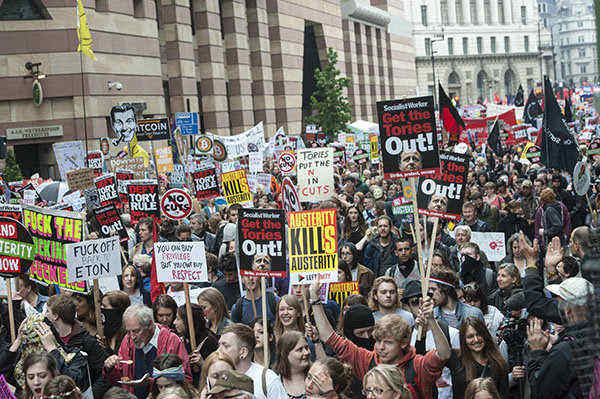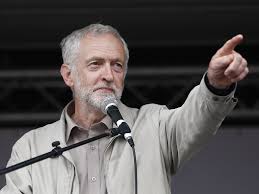by Drew Povey
 Socialists in Britain were shocked when the Tories, the party of the bosses, managed to get re-elected in May. They have now formed a majority government – rather than the coalition they had before. But many working workers are also angry and have shown that they will not accept the austerity, retrenchments legal restrictions that the Tories have promised.
Socialists in Britain were shocked when the Tories, the party of the bosses, managed to get re-elected in May. They have now formed a majority government – rather than the coalition they had before. But many working workers are also angry and have shown that they will not accept the austerity, retrenchments legal restrictions that the Tories have promised.
Further legal restrictions on strikes
One of the first acts of the new government was to issue a drat law to further curtail the right to strike. In the 1980’s Margaret Thatcher placed legal restrictions on strikes. This included laws requiring unions to have a postal ballot before a strike—rather than being able to vote to strike at a mass meeting of trade union members.
These reforms may have contributed to the significant drop in the level of strikes in Britain over the last 25 years. The laws were not repealed by the later Labour governments. Now the Tories want to make the law even harder.
Workers wanting to strike in “important public services” (health, primary & secondary education, fire and transport services) will need to win a total of at least 40 percent of those eligible to vote. But the Tory government is based on the votes of less than 25 percent of all potential voters – showing their clear hypocrisy.
Trade nions already have to give the bosses seven days’ notice of any planned strike. This is to be increased to two weeks in the draft bill. The Tories also plan to scrap “nonsensical restrictions” on bosses using agency or contract workers as scabs to break strikes. Finally the anti-picketing rules will be expanded and workers who SMS or Tweet about a strike may also break the law.
Major protests against the new government
Immediately after the election, 2,000 people protested outside the Tory Party Head Quarters and the following week 4,000 people joined a local demonstration in Bristol called by secondary school students.
Big meetings were then held in many cities – 500 in Manchester and 650 in Nottingham, for example. They also called big demonstrations of thousands of workers in many cities.
On Saturday 20th June a massive End Austerity Now demonstration of up to 250,000 was held in London. Thousands of people joined a similar demonstration in Glasgow, Scotland.
A socialist leader of the Labour Party?
 A socialist MP, Jeremy Corbyn is standing for the leadership of the Labour Party – and is expected to win. He is speaking to thousands of people at meetings in all major towns and cities. Nearly 400,000 thousand people have joined the Labour Party since the election in May and many are expected to vote for Jeremy. The results are to be announced on 12th September.
A socialist MP, Jeremy Corbyn is standing for the leadership of the Labour Party – and is expected to win. He is speaking to thousands of people at meetings in all major towns and cities. Nearly 400,000 thousand people have joined the Labour Party since the election in May and many are expected to vote for Jeremy. The results are to be announced on 12th September.
SNP and Greens
The Scottish National Party (SNP) and the Green Party both called for an end to austerity, are clearly to the left of the Labour Party and did very well in the elections.
In Scotland, the SNP won 55 of the 58 seats. Their vote was largely working class and it was a demand for an end to the neoliberal free market economic polices of the Tories and called for a scrapping of Britain’s nuclear weapons.
Across Britain the Green Party is also beginning to build a left electoral alternative to the Labour Party. Over a million people voted for them, they kept their member of parliament and in 100 constituencies the Greens saved their deposit (gaining more than 5% of the vote). Over the last year tens of thousands of people have joined the Green Party. In many towns and cities the Green Party is now the third biggest party after the Tories and the Labour Party.
The Green Party manifesto was well to the left of Labour. Their main pledges for the election were: end austerity and restore public sector services; create jobs that pay at least a living wage; end privatisation of the National Health Service; £85bn programme of home insulation, renewable electricity generation & flood defences; provide 500,000 social homes for rent by 2020 and control rent levels, and; return the railways to public ownership.
They also regularly support strikes (their member of parliament is a deputy president of the civil servants union) and they are against immigration controls.
British socialists need a continued campaign against the austerity, retrenchments and further restrictions on the right to strike promised by the Tory Government. Where possible, trade unionists and socialists need to unite with Labour Party members (especially if Jeremy Corbyn becomes the new leader), the Green Party (and perhaps the SNP in Scotland) to create a massive campaign that can stop the Tories in their tracks.








